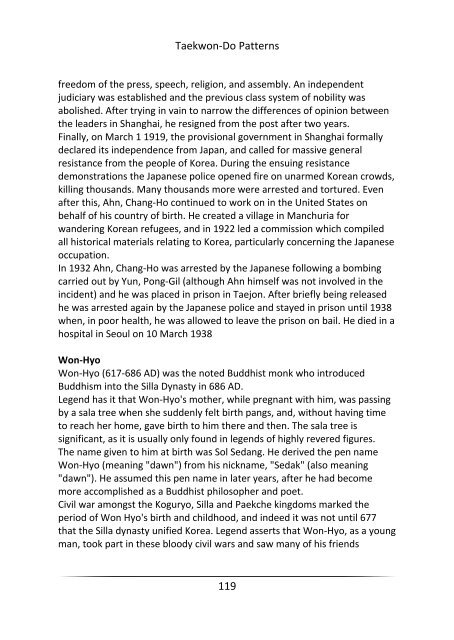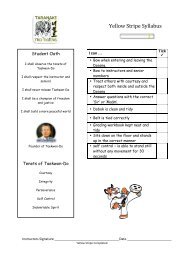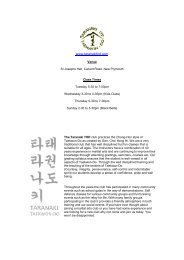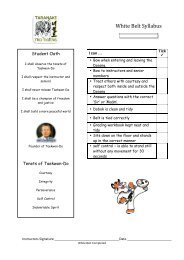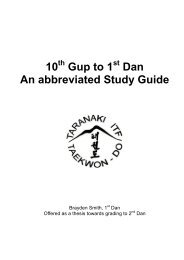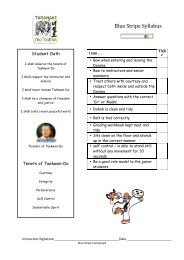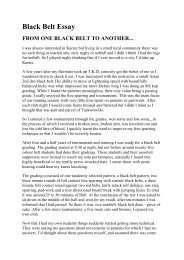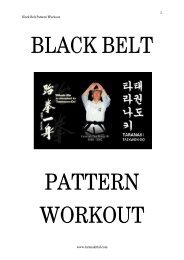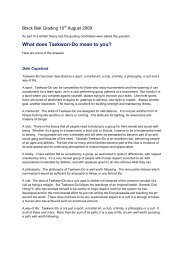Taekwon-Do Patterns (Tul) - Taranaki ITF Taekwondo
Taekwon-Do Patterns (Tul) - Taranaki ITF Taekwondo
Taekwon-Do Patterns (Tul) - Taranaki ITF Taekwondo
Create successful ePaper yourself
Turn your PDF publications into a flip-book with our unique Google optimized e-Paper software.
<strong>Taekwon</strong>‐<strong>Do</strong> <strong>Patterns</strong><br />
freedom of the press, speech, religion, and assembly. An independent<br />
judiciary was established and the previous class system of nobility was<br />
abolished. After trying in vain to narrow the differences of opinion between<br />
the leaders in Shanghai, he resigned from the post after two years.<br />
Finally, on March 1 1919, the provisional government in Shanghai formally<br />
declared its independence from Japan, and called for massive general<br />
resistance from the people of Korea. During the ensuing resistance<br />
demonstrations the Japanese police opened fire on unarmed Korean crowds,<br />
killing thousands. Many thousands more were arrested and tortured. Even<br />
after this, Ahn, Chang‐Ho continued to work on in the United States on<br />
behalf of his country of birth. He created a village in Manchuria for<br />
wandering Korean refugees, and in 1922 led a commission which compiled<br />
all historical materials relating to Korea, particularly concerning the Japanese<br />
occupation.<br />
In 1932 Ahn, Chang‐Ho was arrested by the Japanese following a bombing<br />
carried out by Yun, Pong‐Gil (although Ahn himself was not involved in the<br />
incident) and he was placed in prison in Taejon. After briefly being released<br />
he was arrested again by the Japanese police and stayed in prison until 1938<br />
when, in poor health, he was allowed to leave the prison on bail. He died in a<br />
hospital in Seoul on 10 March 1938<br />
Won‐Hyo<br />
Won‐Hyo (617‐686 AD) was the noted Buddhist monk who introduced<br />
Buddhism into the Silla Dynasty in 686 AD.<br />
Legend has it that Won‐Hyo's mother, while pregnant with him, was passing<br />
by a sala tree when she suddenly felt birth pangs, and, without having time<br />
to reach her home, gave birth to him there and then. The sala tree is<br />
significant, as it is usually only found in legends of highly revered figures.<br />
The name given to him at birth was Sol Sedang. He derived the pen name<br />
Won‐Hyo (meaning "dawn") from his nickname, "Sedak" (also meaning<br />
"dawn"). He assumed this pen name in later years, after he had become<br />
more accomplished as a Buddhist philosopher and poet.<br />
Civil war amongst the Koguryo, Silla and Paekche kingdoms marked the<br />
period of Won Hyo's birth and childhood, and indeed it was not until 677<br />
that the Silla dynasty unified Korea. Legend asserts that Won‐Hyo, as a young<br />
man, took part in these bloody civil wars and saw many of his friends<br />
119


